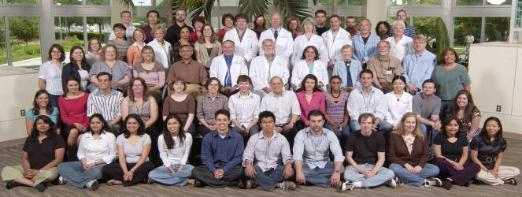Our History
Our roots reach back to 1918 when the two separate but interactive departments of Microscopic Anatomy and Gross Anatomy shared a collaborative faculty and philosophy towards biological research and became a department of Anatomy. Since then, a keen interest in biology at both the microscopic and gross levels has nurtured and advanced our faculty's scientific curiosity to encompass research at the subcellular and molecular level while pursuing an understanding of the biological mechanisms of a living cell.
The curiosity in biology, nurtured by the acute observations of a traditional anatomist, has progressed naturally and has become the foundation for modern biomedical research. This natural progression thus resulted in the change of the department's name in 1990 to the Loyola University Medical Center Department of Cell Biology, Neurobiology and Anatomy, as well as the expansion of the number of our faculty with a common interest in utilizing cellular and molecular approaches in biomedical cell and biological research. Because of our common interests in the molecular basis of cellular interaction, the Department of Molecular and Cellular Biochemistry joined our faculty as a division in 2000.
Thus, research currently focuses on understanding the developmental and cellular aspects of the nervous, immune and other mammalian systems. In addition, research also focuses on the two distinct, yet inseparable disciplines of immunology and neurobiology. Important interaction between these two systems is being explored through collaboration among students and faculty in different laboratories.
Knowledge in the biomedical sciences has been accumulating at an exponential rate over the last decade. New information, while expanding our understanding of living cells at the molecular level, only points to our need to understand the interaction between cells of different organs in a living body. It is our commitment not only to provide you, the future biomedical researchers, with advanced research techniques and a current understanding of the living cell, but also to cultivate your ability to develop this same passion for assimilating modern thinking and applying it to the understanding of the whole organism to the molecular level.

